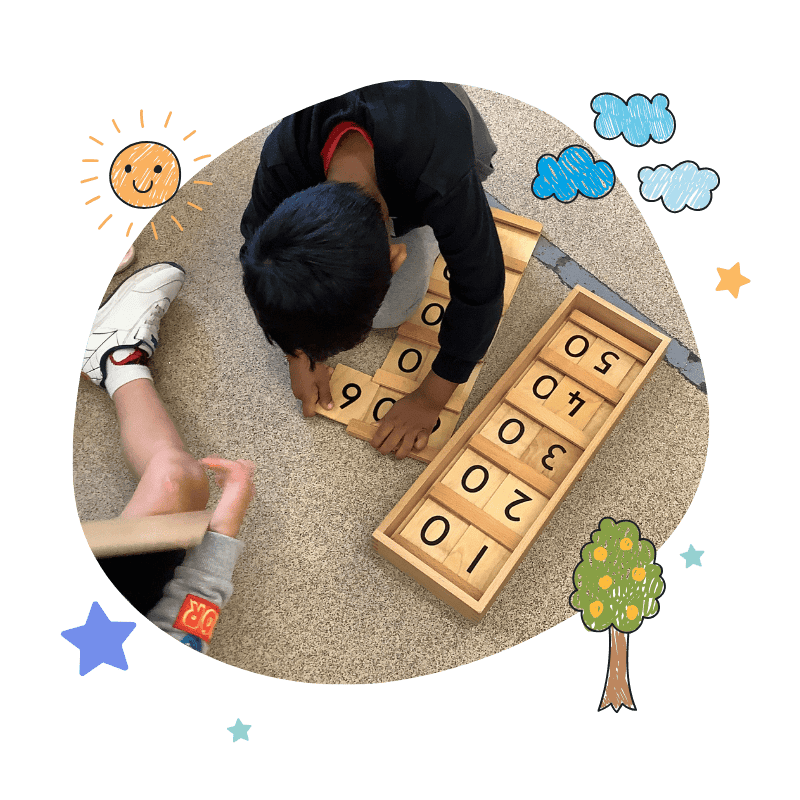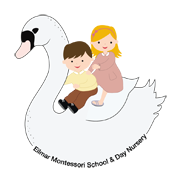Montessori and EYFS

Child-Centred Approach
Montessori: The Montessori method is highly child-centered, focusing on allowing children to direct their own learning through exploration and discovery. The teacher acts more as a guide or facilitator than a traditional instructor.
EYFS: In the EYFS framework, there is a strong emphasis on child-initiated learning and following the interests and needs of the individual child. The role of the educator is also to support and guide, rather than direct learning.
Learning Through Play
-
Montessori: Montessori places a strong emphasis on purposeful, hands-on learning. While it’s not “play” in the traditional sense, Montessori activities are designed to be engaging and to allow children to explore and learn through tactile experiences.
-
EYFS: The EYFS framework explicitly recognises the importance of play in early learning. It stresses that children learn best when they are engaged in purposeful play, which is often guided by the adult but led by the child’s interests.


Prepared Environment
Montessori: The prepared environment in a Montessori setting is meticulously organised and designed to foster independence and exploration. The materials are accessible, and the space is arranged to encourage free movement and choice.
EYFS: EYFS also emphasizes a rich, stimulating environment where children have access to diverse resources that support exploration, creativity, and learning. The environment in an EYFS setting is carefully planned to ensure it is safe, engaging, and allows for a variety of experiences.
Holistic Development
Montessori: Montessori education focuses on the holistic development of the child—intellectual, emotional, social, and physical. Montessori emphasise the development of independence, self-regulation, and social skills alongside academic learning.
EYFS: The EYFS framework also promotes holistic development, divided into 7 areas of learning: Personal, Social, and Emotional Development; Communication and Language; Physical Development; Literacy; Mathematics; Understanding the World; and Expressive Arts and Design. It stresses the interconnectedness of all areas of a child’s development.


Individual Pace of Learning
Montessori: In Montessori, children are encouraged to learn at their own pace. There is no rigid timetable; rather, children work on tasks or activities for as long as they need, fostering a deep understanding of the material.
EYFS: EYFS also acknowledges that children develop at different rates and that learning should be tailored to individual needs. The emphasis is on providing developmentally appropriate experiences rather than a one-size-fits-all curriculum.
Observation and Assessment
Montessori: Montessori educators observe children closely to understand their interests, developmental stages, and needs. These observations guide the teacher’s choice of materials and how they support the child’s development.
EYFS: In EYFS, observation is also a key method for assessing children’s progress. Educators are expected to observe, plan, and assess based on the children’s actions, behaviours, and achievements, using these insights to inform future learning.


Focus on Independence and Responsibility
-
Montessori: One of the core principles of Montessori is fostering independence. Children are encouraged to take responsibility for themselves and their environment from an early age, including self-care, choosing activities, and cleaning up.
-
EYFS: EYFS also emphasises independence, particularly in relation to personal care and social skills. It encourages children to make choices, take responsibility for their actions, and develop confidence in their abilities.
Respect for the Child
Montessori: Respecting the child’s autonomy and dignity is central to the Montessori method. Children are treated as capable, competent individuals, and their natural curiosity and motivation to learn are nurtured.
EYFS: Similarly, EYFS values the respect of the child as an individual. It stresses the importance of building positive relationships, fostering self-esteem, and providing a safe, supportive environment for learning.

Key Differences:
While Montessori and EYFS overlap in their values, they do have some differences:
- Structure and Approach: Montessori is often seen as more structured in terms of materials and method, with a strong emphasis on Individualisation learning and specific resources (such as Montessori-specific materials). EYFS, while allowing for flexibility, operates within a more defined framework of learning outcomes.
- Role of the Teacher: In Montessori, the teacher is often seen as a “guide” who introduces children to the environment and materials, while in EYFS, educators are more likely to engage directly in teaching, planning activities, and guiding play.

